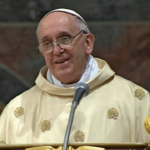“An overview of Laudato si’, Pope Francis’ groundbreaking encyclical on environmental care, which has been praised as ‘the most important piece of intellectual criticism of our time.”
From contemplation to action
Laudato si’ blends, on the one hand, striking—and at times poetic—theological reflections on the importance of caring for the natural world with, on the other hand, urgent calls for radical political action.
For example, the Pope states: “The universe unfolds in God, who fills it entirely. Thus, there is a mystical significance to be discovered in a leaf, in a mountain path, in a dewdrop, in the face of a poor person. Gazing in awe at a mountain, we cannot disjoin this experience from God” (233).
These reflections lead him to condemn “politics concerned with immediate results, supported by consumerist sectors of the population,” and “driven to produce short-term growth.”
What is needed, he insists, is “a new way of thinking about human beings, life, society, and our relationship with nature” (178).
The case for ‘integral’ development
At the heart of Laudato si’ is the concept of integral ecology—the idea that the climate crisis is deeply connected to our current social, political, and economic challenges, and cannot be effectively addressed in isolation from them.
“We are faced not with two separate crises, one environmental and the other social,” the Pope writes, “but rather with one complex crisis which is both social and environmental.”
Therefore, he encourages “a multidimensional approach to the fight against poverty,” which “protects nature” yet at the same time “gives dignity back to the excluded” (139).
This vision provokes Pope Francis to suggest integral human development—a model of development where economic growth and technological progress are not the only prerogatives. Even though growth is there, he reminds us that it must go hand in hand with other elementary values such as respect for nature, respect for the cultures of humankind, the poor, and vulnerable, and a concern for the defense of the animal kingdom.

Laudato si’ in practice
One of the main consequences of Laudato si was the rise in Catholic eco-action.
Numerous new Catholic environmental organizations were created directly in reaction to the encyclical, such as the Laudato Si’ Research Institute at Campion Hall, Oxford, and the global Laudato Si’ Movement.
Caritas Internationalis, the Catholic Church’s charitable body, and others already in existence also broadened their green activities.
According to a 2019 paper in the journal Biological Conservation, there is even proof that Laudato si’ raised international concern about environmental issues, with the development of a great deal of interest in most Catholic countries.
Climate, instability, and war
The global agenda has gradually shifted away from environmental issues in recent years. In order to give priority to military expansion or economic growth, many nations are currently reversing their climate policies.
Significant changes in the geopolitical environment are reflected in these decisions. However, the Pope cautioned that “peace, justice, and the preservation of creation are three absolutely interconnected themes, which cannot be separated and treated individually” (92). Leaders would be wise to take note of this.
Unresolved climate change will worsen resource scarcity, increase inequality, and spur migration, all of which fuel instability and conflict.
In a statement that perfectly encapsulates Laudato si’, the Pope states: “Everything is connected.”





